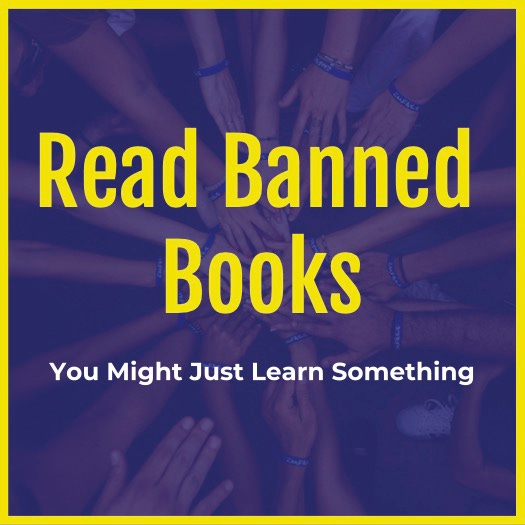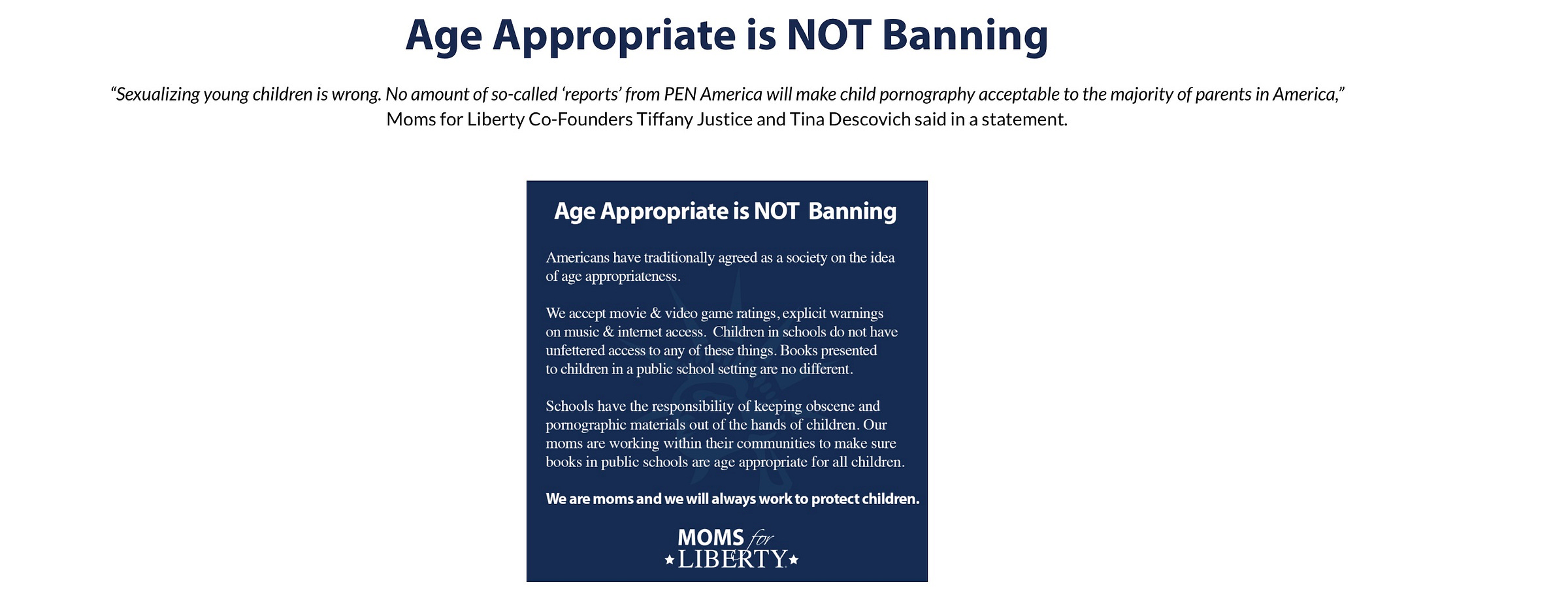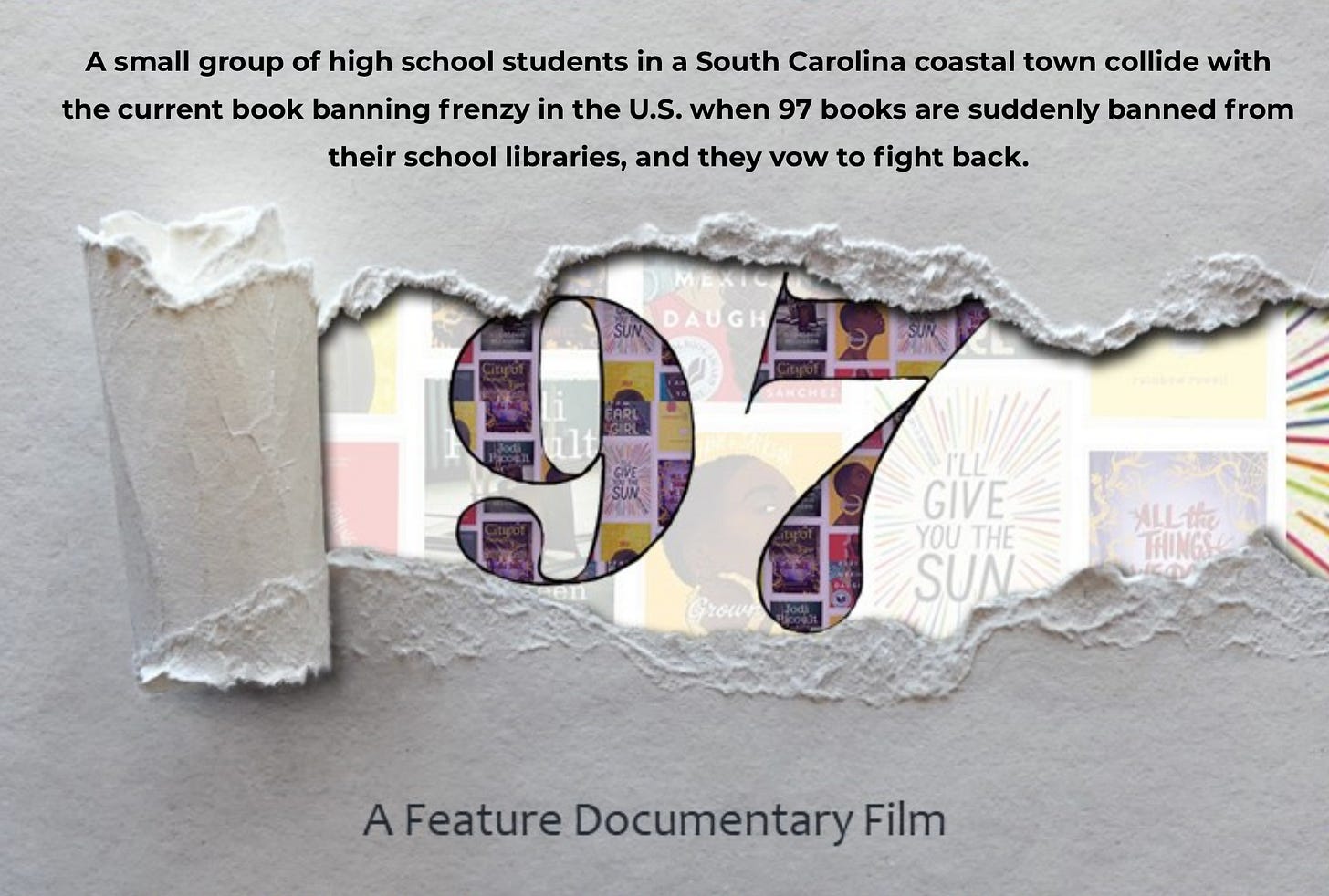When Book Banning Came to My Kitchen Table
A researcher Investigates the good, the bad, and the just plain scary as all hell!
Thank you to everyone who entered my 2023 Women’s Fiction Day Giveaway. Congrats to the winners, Julia Daily and Judith Adler. If you didn’t win, I hope you find this newsletter a fantastic consolation prize.
In this issue of Research for Writers and Other Curious People, I’m taking a researcher’s view at book bans. I had planned to discuss book bans in October during Banned Books Week, but with so much happening across the country, I’m bursting to write about this now.
For the record, I’m not in favor of book bans. Period. My look between the covers on this subject is not intended to change my mind or the mind of anyone reading this.
When Book Banning Came to My Kitchen Table
In September 2021, Fairfax County Public schools (FCPS) at the request of one parent, pulled two LGBTQ+ titles from school libraries, Gender Queer by Maia Kobabe and Lawn Boy by Jonathan Evison. (I own a copy of Gender Queer.) The targeted source school was Fairfax High School, Fairfax, Virginia where my child was a junior.
My child was a member of the school reading club and I knew the head librarian. The idea that one parent could choose to censor what an entire county of children (my child!) could read was shocking. The book ban came on the heels of COVID, after a difficult year and a half of online learning. Just as students, teachers, and families were adjusting to a social distance return to school, we had a new controversy. As if life wasn’t bumpy enough.
What follows is a look at the push-pull over this issue across the United States.
(Disclaimer: I am not a lawyer)
Censorship
Parental rights
Obscenity and Community Standards
Censorship
The First Amendment Encyclopedia calls book banning the most widespread form of censorship in the United States. I appreciate this site’s straightforward discussion of the censorship issue.
Censorship — the suppression of ideas and information — can occur at any stage or level of publication, distribution, or institutional control. Some pressure groups claim that the public funding of most schools and libraries makes community censorship of their holdings legitimate.
To counter charges of censorship, opponents of publications sometimes use the tactic of restricting access rather than calling for the physical removal of books. Opponents of bans argue that by restricting information and discouraging freedom of thought, censors undermine one of the primary functions of education: teaching students how to think for themselves. Such actions, assert free speech proponents, endanger tolerance, free expression, and democracy.
Parental Rights or Busybodies?
Parental rights vary from state to state but boil down to a parent or guardian having the right to make decisions for their minor children. Legally, this covers issues of well-being, medical decisions, religion, and education. But, what happens when your decision about your children affects my children? Sparks fly and they are flying with the group, Moms For Liberty. They are a major proponent of book bans and have had serious traction in Florida and Texas. From their website.
No one is refuting that Children + Porn + School = Bad.
Schools employ librarians and educators to evaluate and curate books for the grade level of the students. As for the video game, music, and movie ratings, those too are issues of censorship and too big to discuss here. However, students are not playing video games in school (though they do on their phones) watching movies, (actually, they download content and watch during lunch and the same for listening to music.) Yet when educators request to remove phones and tablets from students, parents go nuts. That too is another discussion. I digress.
For the record, in June, The Southern Poverty Law Center named Moms for Liberty an extremist hate group. They think this is great as it raises their profile.
George Mason University (Go Patriots!) Maoria Kirker, a teaching and learning lead for the university libraries has this to say about book banning.
Read the full piece
Limiting access to books might solve one family’s concerns about their child reading a particular text, but it removes the opportunity from another child. Book banning has a ripple effect that impinges the rights of other readers. While families have the right to restrict their children from reading certain books, they can’t enforce that on other families. Banning books also has the potential to create significant gaps in knowledge for young learners. Whether it is a canonical classic or a new book that is banned, book banning and limiting access have the potential to leave students behind their peers.
Obscenity and Community Standards
A look at the American Library Association (ALA) list of most banned books in 2022 shows a pattern - LGBTQ+ titles, novels by marginalized authors (hello Toni Morrison) and books that depict sex and drugs.
Curious how many books in your state were banned? Scroll down to the USA map in the article.
In 1973, the Supreme Court established the Miller Test for obscenity.
From the First Amendment Encyclopedia.
…the Court ruled that a trier of fact — usually a jury — must determine whether the average person, applying contemporary community standards, would find that the work, taken as a whole:
appeals to the prurient interest;
depicts or describes, in a patently offensive way, sexual conduct specifically defined by the applicable state law; and
lacks serious literary, artistic, political or scientific value.
I argue that community standards, entertainment tastes, and social norms have changed in fifty years. I would also like to stick a pin in the questions, whose community are we talking about; and who in a community is allowed to set the standards? This is the essence of a democracy. But I also argue that district gerrymandering smacks that idea in the face. Again, another form of censorship.
Politics, Religion, and Don’t Talk about Sex — It’s SCARY
Censorship and book banning are about controlling a narrative. The people who can control the ideas are often the people seeking the most power. That cuts both ways, liberal or conservative. But … this push is coming from conservative Christian groups. According to the Christian Century, “Why Books Get Banned,
These campaigns [book bans] are aimed not at strengthening public education but at weakening it. They are part of a broader movement fueled by billionaires, including the DeVos and Walton families, who have long sought to undermine traditional public schools—an ideological project and, for the for-profit companies that manage many charter schools, a lucrative one. The campaigns succeed not because Americans want their children’s education to be shaped by oligarchs but because they exploit people’s fear and mistrust. Some parents don’t trust teachers with novels that address our country’s history of racism. Others fear that books about inequality will cause their children psychological anguish or undermine their faith in American institutions.
So many fears. Popular banned subjects found in books.
Racial Issues - anyone not white?
Encouragement of "Damaging" Lifestyles - LGBTQ+
Blasphemous Dialog -for chrissakes, not this shit again
Violence or Negativity - too many tropes to name
Presence of Witchcraft (hello Harry Potter Series) How awful that children stayed up past their bedtimes reading Harry Potter on release day - READING FOR PLEASURE! Oh wait, pleasure, isn’t that also sex??
Sexual Situations or Dialog - “Viagra good, abortion bad?”
Religious Affiliations (unpopular religions) anyone not Christian?
Political Bias - anyone you didn’t vote for?
Age Inappropriate who decides?
Here is an abbreviated round-up of the tug-of-war happening in the USA over book banning. If only it were as cute as these puppies.
Texas Governor Abbot Signs Book Ban on Sexually Explicit Books
Illinois Becomes First State to Ban Book Bans
Ron Desantis Blazing a Trail on Book Bans
Biden Appoints Anti-Book Ban Coordinator as Part of LGBTQ+ Protections
The list goes on. But as a final thought, check out the trailer for 97 Documentary and you can donate! This indie filmed is using the power of film, story, and imagery to tell their side of the book banning story.
As for the book ban I faced at my kitchen table, it has a justice served happy ending. The two books removed were reviewed and deemed appropriate for the community. My child was able to discuss the merits of the two books and others in the library collection with the librarian. It led to lively and interesting discussion about the First Amendment, book bans, censorship, and what was interesting to read or ignore. You can read the FCPS statement here.









